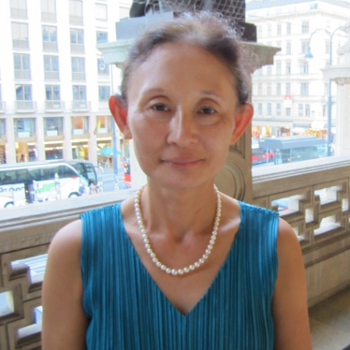Christmastime in Vienna, the streets are again filled with tourists and the opera house is full. Sandwiched between such audience pleasers as Die Zauberflöte and Die Fledermaus was the 394th revival of the 1968 production of Der Rosenkavalier by Otto Schenk. It is a hyper-realistic production, with a Rococo-style bedroom of the Marschallin in Act 1 followed by an opulent entry hall of Faninal’s palace with a large splendid wall painting of sky blue and angels in the background. By the Act 3 inn scene, the production looks old and faded; the darkness of the interior does not help a rather static and awkward stage direction of the crowd scene.
Schenk’s traditional and literal production affords an opportunity to devote one’s undivided attention to the musical and theatrical performance on stage and in the pit. The Wiener Staatsoper assembled an impressive cast of singers for the principal roles, with major contributions from the house’s ensemble members in smaller roles; the chorus was exemplary. Philippe Jordan conducted the orchestra with deftness and finesse, often allowing its splendid musicians to show off their virtuosity and yet he was always mindful of volume control to support the singers when this was necessary.
Günther Groissböck has made Baron Ochs his signature role the last several years, and he is now experienced enough to perform this challenging role with both comfortable ease and spontaneous dynamism. His voice rang out with pride in Act 1, explored the depth of Ochs’ slimy ambition in Act 2, and was unapologetically callous in Act 3. As Octavian, Kate Lindsey cut an attractive boyish figure and moved well on stage. Her clean and distinctive mezzo cut through the orchestra to express Octavian’s youthful exuberance and frustration. The voice also blended well with the two sopranos in their several duets and in the famous trio towards the end of Act 3.
Vera-Lotte Boecker played Sophie not so much as a damsel in distress as a strong-willed girl on the verge of womanhood. This Sophie was not a delicate coloratura but a fully formed lyric, and her voice was a delightful combination of beauty and power. The veteran Adrian Eröd was an elegant Faninal, Regine Hangler an unusually well-sung Marianne, and Wolfgang Bankl a grumpy police commissioner. The scheming pair, Thomas Ebenstein as Valzacchi and Monika Bohinec as Annina, were class act scene-stealers, and Juan Diego Flórez made an excellent cameo as the Italian Singer.
With all the extraordinary talent on stage and in the pit, the evening’s star was the Bulgarian soprano Krassimira Stoyanova, whose Marschallin was one of the most accomplished and moving assumptions of the role in my experience. From her first utterance in her amorous exchange with her young lover Octavian to the final extraordinary “Ja, ja,” Stoyanova was in complete command of her voice and the character. Her voice, sumptuous, warm and full of colour, soared with polished beauty above the orchestra and dwindled to contemplative whisper during the Marschallin’s monologue in Act 1. One could follow the contour of this aristocratic woman’s thoughts, her fear of aging and her wisdom of accepting whatever the fate brings to her, as Stoyanova delineated each and every word and line with clarity and thoughtfulness. Her acting was extraordinary, as every glance, every tilt of her head and her quiet posture conveyed dignity, authority, sadness and tenderness. There was no need for subtitles in whatever language as Stoyanova arrived at the inn in Act 3 to execute her “finesse” in ending the confusing proceedings and putting her final seal of approval to end her affair and to hand her lover to a young woman. It was a breathtaking, heartbreaking, masterful performance. The final trio and duet, always a highlight of the opera, was unusually poignant and yet joyful, as the Marschallin let go of both her lover and life’s travails with lighthearted sadness.




